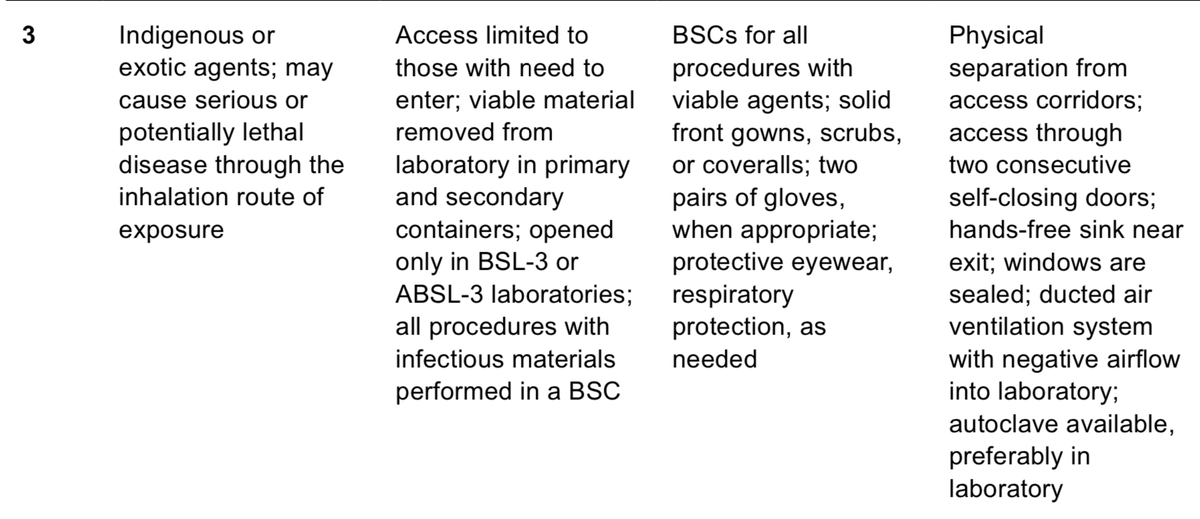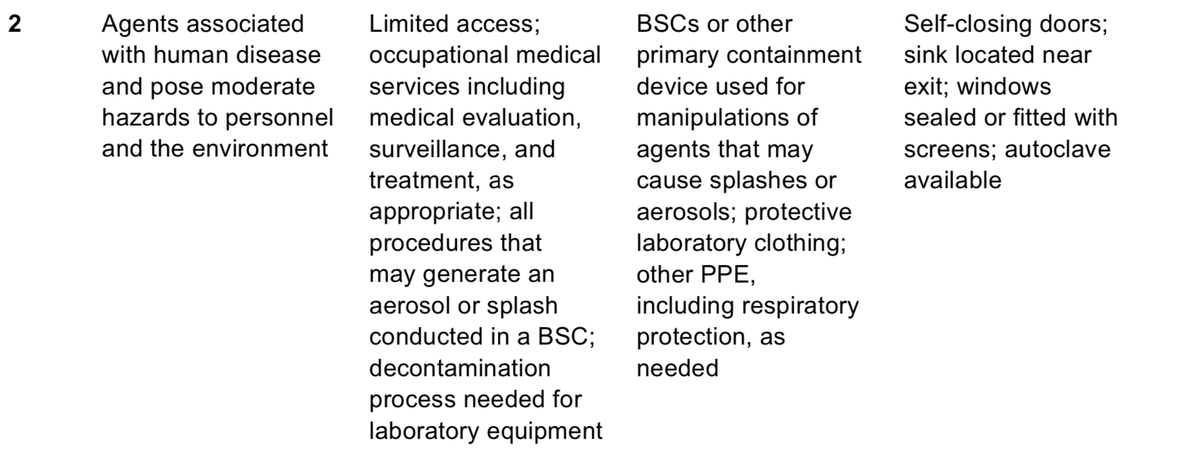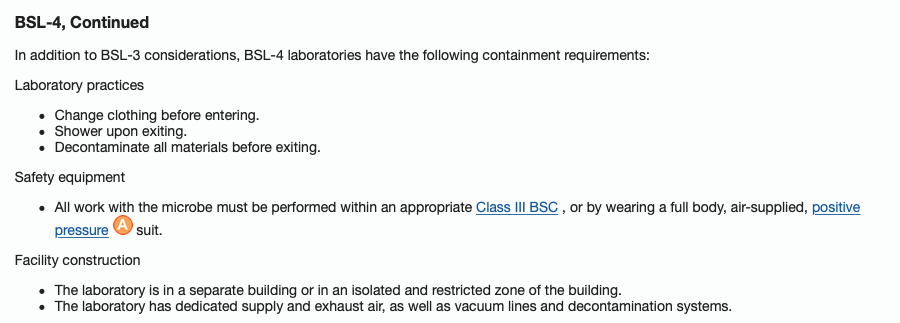
Some more thread on BSL & journalism.
Several folks on this thread have pointed out, correctly, that SARS-COV2 research in Wuhan happened in BSL2 and 3 labs, not in the BSL4 one.
This fact has a couple of implications for the lab leak argument and the journalism covering it. 1/
Several folks on this thread have pointed out, correctly, that SARS-COV2 research in Wuhan happened in BSL2 and 3 labs, not in the BSL4 one.
This fact has a couple of implications for the lab leak argument and the journalism covering it. 1/
https://twitter.com/TomLevenson/status/1400834391883104261
2/ The basic questions remain. First, what was done at BSL2 vs. 3? The question is vital to the claim of a lab leak, as BSL2 facilities are not particularly secure. (Walk down the hall of a bio building at any R1 university and you'll likely see a BSL2 placard or two)...
3/ BSL3 labs, by contrast, are heavily defended. Not to the ultimate example of biomedicine's supermax BSL4 facilities but still...they handle some very scary viruses indeed. Extensive list of viruses (see other tables for other agents), pp 308-328: cdc.gov/labs/pdf/SF__1… 



So if you want to make the argument for a lab-leak, or if you are a reporter writing on this question you need to know two things: first, what sequence of events in what setting would produce an infection and a leak into the general population...
5/...and whether those events took place in a lab in Wuhan where SARS-COV2 could encounter a person.
To begin to ask the right questions, lots of different contextual information would help.I don't cover this area, so I'm broadly ignorant of such context. So...
To begin to ask the right questions, lots of different contextual information would help.I don't cover this area, so I'm broadly ignorant of such context. So...
6/ It was only a few minutes ago the that I read that bit of the CDC's Biosafety in Microbiological and Biomedical Laboratories (BMBL) 6th Ed. that summarized research on the history of lab infections...
7/ It's hard to get stats on such infections, but for the 20 yrs from 1979, a literature review turned up 1,267 cases and 22 deaths, w. 51% of those cases coming in research labs (vs. clinical ones). So, roughly 32 cases/yr worldwide in research labs of every safety level...
8/ It would take more reporting, possibly quite a bit, to really grasp the meaning of that number. But at the least it sets up the prior that accidental lab infection is fairly rare, and it justifies at least testing the assumption that it gets more rare as BSL levels climb...
8.5/ Source: cdc.gov/labs/pdf/SF__1… p. 2.
9/ I've already gone on at length in the thread this steps off from about the lack of rigor in making and reporting the lab-leak assertion, so I won't spend a lot of time here on it, except to say that "could have" is no substitute for "did"--and...
10/...even making the "could-have" claim needs to be done with a much more inquiry into what's needed to make "a possibility," reality.
So from here, I want to go to the moving goalposts & what seems to me to be intellectual sleight of hand among some pushing lab leak claims...
So from here, I want to go to the moving goalposts & what seems to me to be intellectual sleight of hand among some pushing lab leak claims...
11/ Go back to my mention of BSL4 restrictions, despite the fact that in Wuhan research was done at lower containment levels. Why did I make that error, or omit the BSL2/3 argument until this thread?
Because I was mostly reacting in irritation to Baker's NYMag piece...
Because I was mostly reacting in irritation to Baker's NYMag piece...
12/ And the climate that it inspired. It's worth a reread with a "prove it" frame of mind. You'll find that it's convincing as long you allow Baker's excellent rhetorical skills to sweep you along–he is a fine prose-maker...and perhaps less so when you go all MO on the piece...
13/ And you'll note that when he discusses Wuhan he emphasizes how unlikely (it seems to him) that the virus would emerge in the only city in China that has a BSL4 lab. That's reemphasized a fair amount; the only time Baker mentions other BSL levels is on other, US based work...
14/ So Baker argues for an engineered virus coming out of China's one supermax bio lab in part by pounding on Wuhan's BSL4 facility's sinister uniqueness...
15/ despite that his case for an accident wld be stronger if it engaged the public knowledge that Wuhan's coronavirus surveillance happened at BSL2/3.
So what's up? Why make the weaker argument but for a rhetorical end, because BSL4 is the scary place mad scientists revel in...
So what's up? Why make the weaker argument but for a rhetorical end, because BSL4 is the scary place mad scientists revel in...
16/ Here I'll come to rest, with my frustration that the quality of argument &, in the reporting & promotion of stories about the lab leak, reliance on the unprovable negative: "is a lab leak impossible?" is fundamentally a distraction, both from the best reporting on all this...
17/ and the actual scandal: how politicians in the US (Trump and the GOP) and around the world, botched the response to the actual pandemic, and are now grasping at anything, including origin stories, to distract from their fatal failures.
So: in sum...
So: in sum...
18/ Could a lab leak have happened? As a hypothetical, sure. But it remains not just unproven, but not even fully argued, for the omissions in the reporting/investigation, some of which I've mentioned, and more that I have not.
What we do know is...
What we do know is...
19/ There are lots of clearly identified zoonotic instigators of local or global outbreaks of disease. There have been a handful of clearly documented lab infections of all causes, and no widespread outbreaks documented.
Bet your rent money as you see fit. /fin
Bet your rent money as you see fit. /fin
Hey, @threadreaderapp unroll please
• • •
Missing some Tweet in this thread? You can try to
force a refresh




